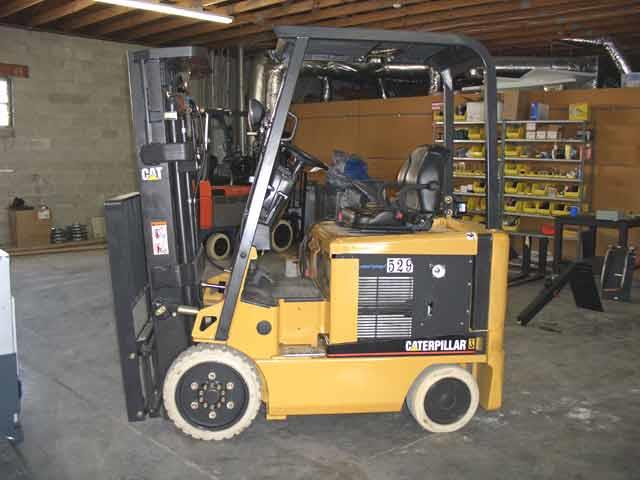 The Cat Lift Truck counterbalanced forklift with the Hydricity pack. |
by US correspondent Roger RenstromGeneral Hydrogen Corp, of Richmond, Canada, has made its first commercial sale of a fuel-cell-powered Hydricity pack to Cat Lift Trucks, of Houston, Texas, USA.
The Hydricity-brand pack, to be delivered in July, will be used in a counterbalanced electric forklift. The packs "have shown they can triple the runtime of battery-electric forklifts out to 18 hours, compared to conventional lead-acid batteries", said Frank Trotter, president and CEO at General Hydrogen.
Customers have field-tested General Hydrogen equipment over two years, said Tony Troutt, General Hydrogen vice president for business development, in Gallatin, Tennessee, USA.
"Our equipment has been used in many different makes and models of forklifts. The relationship with Cat is not based on one single trial at any given customer. It is based on the success and reliability we have shown in varied equipment in multiple applications and interest being generated by end users of the equipment."
General Hydrogen has Hydricity packs available now for class 1 rider trucks and class 2 narrow aisle trucks and expects to be ready to outfit class 3 hand trucks next year.
"Our goal is to give end users the maximum range possible," Troutt said. "If the end user has to fuel the vehicle as often as he has to change a battery, he loses a great deal of the benefits associated with this type of system. Whether they are using traditional charging methods or fast charge, we see a desire for end users to reduce the frequency of changing" batteries or recharging them.
Hydricity packs contain a Ballard Power Systems Mark 900 Series proton-exchange-membrane fuel stack and a Lincoln Composites polymer-matrix-composite tank that can store about 3.7kg of compressed hydrogen at 10,000 pounds per square inch (4,536kg per 6.45 square cm). Refuelling can occur in three to five minutes. Hydricity packs have the same dimensions and weight as conventional lead-acid batteries.
Hundreds of potential fuel cell suppliers to the North American market include Ballard, Burnaby, Canada; UTC Fuel Cells, South Windsor, Connecticut, USA; Siemens AG, Munich, Germany; Teledyne Energy Systems Inc, Hunt Valley, Maryland, USA; Hydrogenics Corp, Mississauga, Canada; and Nuvera Fuel Cells Inc, Cambridge, Massachusetts, USA.
During June, Cellex Power Products Inc plans to install 12 power units on pallet trucks at two Wal-Mart distribution centres in Ohio, USA, as part of a fuel cell commercialising plan.
The Cellex installations are an extension of the firm's forklift-related work with Wal-Mart's logistics subsidiary, based in Bentonville, Arkansas, USA (
Forkliftaction.com News #221)
Cellex's CX-P150 power units, suitable for all forklift models, will be used in pallet trucks from Crown Equipment Corp and Barrett Industrial Trucks. BOC Group plc will supply the fuelling solutions with forklift operators fuelling trucks indoors.
Richmond-based Cellex has trained forklift dealer OKI Systems Ltd to service the units.
In addition, an independent development at Toyota Industries Corp (TICO) has created a prototype fuel cell hybrid system for forklift use. TICO developed the Toyota FCHV-F fuel cell system in cooperation with Toyota Motor Corp (TMC), making use of TMC technology and sharing components in the automotive field. For many years, TICO has developed power electronics technology for its electric forklifts and gained fuel cell knowledge through collaboration with TMC's automotive developments (
Forkliftaction.com News #230).